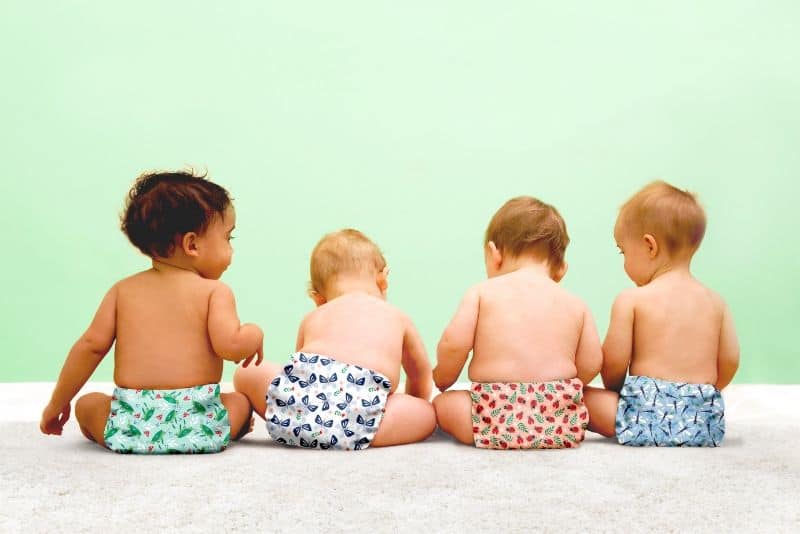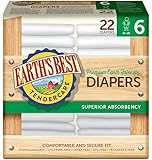Parents are turning to organic diapers over the standard to be more eco-friendly, but is it really better for the baby?
Generally, both these conditions can be satisfied, but you have to know what you are looking for.
While the solution may be better for the environment, it does not instantly mean that it is a better diaper than what is readily available on the market and any good mom will always select what their child feels the most comfortable in.
Top 7 Organic Disposable Diapers On The Market
1. Andy Pandy Bamboo Disposable Diapers
- The moisture wicking and thermal regulating bamboo prevents your babys delicate skin from getting painful irritation and rashes.
- Soft bamboo disposable diapers are ultra-comfortable to wear, and they are hypoallergenic and antibacterial to prevent irritation and chaffing.
- Deluxe Andy Pandy diapers have a aloe liner to keep your sweet baby’s skin hydrated and prevent itchiness.
Prices pulled from the Amazon Product Advertising API on:
Product prices and availability are accurate as of the date/time indicated and are subject to change. Any price and availability information displayed on [relevant Amazon Site(s), as applicable] at the time of purchase will apply to the purchase of this product.
It is always best to start with the best and Andy Pandy diapers genuinely don’t disappoint.
A mom-created company who puts the comfort of the baby at the forefront and doesn’t look to cut corners anywhere.
Because of this, Andy Pandy diapers are 100% organic, meaning they are free of any artificially made chemicals, especially chlorine, phthalates, latex, preservatives, and the like.
This also makes them hypoallergenic, letting your baby and his bottom breathe free knowing it is safe in the snug comfort of these bamboo beauties lined with aloe-based oils that help keep it smooth and safe.
They were my go-to for both my son and daughter as I’ve had little complaints from them during use, and will definitely be so in the future if need be.
While being on the pricier side, they are well worth the investment and will keep your toddler satisfied throughout the day.
An added bonus is that if you are not satisfied with their product, you can get a full money refund from them.
Apart from being an Amazon’s Choice, it is no wonder they are at the top of many other sites’ lists of best diapers.
2. Earth’s Best TenderCare Disposable Diapers
- One pack of 22 Earths Best Chlorine-Free Disposable Size 6 Diapers
- Chlorine-free, latex-free, dye-free and fragrance-free
- Moisture barrier cuff and breathable sides prevent leaks and keep baby comfortable and dry
- Available in seven sizes
Prices pulled from the Amazon Product Advertising API on:
Product prices and availability are accurate as of the date/time indicated and are subject to change. Any price and availability information displayed on [relevant Amazon Site(s), as applicable] at the time of purchase will apply to the purchase of this product.
When they say earth’s best, they come pretty darn close.
Although not made out of bamboo like most other competitors, Earth’s Best is made from a more “American” variant of corn and wheat starch, which makes them ultra absorbent – even more so than some of the bamboo variants on the market – but they sadly are not compostable.
That said, they are entirely fragrance-free and not having that pesky chemical smell around the house will be a blessing.
Lord knows I inhaled my fair share of diaper fumes during my early days as a mom.
And yes, this also means that they are also free of any harsh chemicals like chlorine and the others mentioned before.
Not only that, but Earth’s Best come with breathable sides, keeping the diaper nice and tight around the baby’s waist while making the rest of the nappy a lot more comfortable for them, making your little one happier and more mobile in their escapades.
3. Bambo Nature Eco Friendly Premium Baby Diapers
- Breathable backsheet helps prevent rashes and new feather-soft materials keep babies comfortable and parents happy
- Now featuring a Wetness indicator so parents know when changes are needed
- Certified skin-safe means our products are dermatologically tested and free of all known allergens, perfumes and harmful chemicals
Prices pulled from the Amazon Product Advertising API on:
Product prices and availability are accurate as of the date/time indicated and are subject to change. Any price and availability information displayed on [relevant Amazon Site(s), as applicable] at the time of purchase will apply to the purchase of this product.
One of the most baby friendly and eco friendly diapers out there and ordained with a number of eco and baby safety awards like the Nordic Swan and the Danish Asthma/Allergy certification, Bambo Nature diapers live up to their reputation.
Their ultra absorbent nature and moisture-wicking help keep the baby dry at all times, whether it is during the day or through the night, as well as being the best at preventing any irritating rashes and chafing from diaper use.
I have heard of other moms praising these ones especially, but I personally haven’t had any experience with them since my toddlers didn’t have a problem with chafing.
Most of this comes from the plush, super-soft non-woven back sheet that helps keep your baby’s delicate skin safe from any discomfort.
They come with a built-in wetness indicator, a thin strip that changes color to let you know when your toddler’s tooshie needs a diaper change.
They are, however, quite pricey, making them a bit out of some households’ budgets and a less favorable option among all the other choices.
4. Honest Company Diapers
- Hypoallergenic, super soft, ultra absorbent, gentle, safe, and disposable diapers in adorable posh prints with soft, stretchy side panels, a comfy elastic waistband, sure fit leg cuffs, and fastening tabs
- SUPER-SOFT LINER provides the ultimate comfort for delicate skin while rapidly funneling moisture away
- ECO FRIENDLY & SUSTAINABLE MATERIALS: Super absorbent diapers have a bio based core with sustainably harvested fluff pulp and plant derived materials
- MADE WITHOUT: Latex, chlorine processing, fragrances, or lotions.
Prices pulled from the Amazon Product Advertising API on:
Product prices and availability are accurate as of the date/time indicated and are subject to change. Any price and availability information displayed on [relevant Amazon Site(s), as applicable] at the time of purchase will apply to the purchase of this product.
Another great brand of organic disposable baby diapers, Honest diapers worry about both the baby and the environment, much like most on this list.
While not entirely free of chemicals, they try and cut down on them as much as they can and put what they do utilize to good use, making the diaper lining super soft and creating super-absorbent diapers, allowing for up to 17 times the weight of the lining in moisture absorption.
The rest of the nappy is made from fluff pulp that they sustainably source for diaper production, which makes the rest of the diaper as comfortable and agreeable to your baby’s sensitive skin as it can get.
Not only that, but they are one of the more affordable on this list – comparable to the prices of common, artificial diapers – and they let you choose from a variety of cute little designs to personalize your baby’s diaper and make them look stylish.
They are latex-free, chlorine-free and free of any artificial fragrances and oils much like the rest of them, but they do use sodium polyacrylate as I had mentioned previously to add the extra comfort and flexibility to the diaper, which is known to potentially cause rashes on the baby’s skin.
I haven’t used them too often, but for the times I have, I haven’t had that issue with my children when they needed them.
A good alternative to Honest diapers is Hello Bello which you might also want to consider.
5. Naty Diapers
- 0% plastic on skin.
- Mainly made of plant-based material with reduced risk of allergies and diaper rash.
- OEKO-TEX Standard 100 and Vegan certified.
- Renewable packaging certified by TÜV.
- 100% FSC certified pulp.
Prices pulled from the Amazon Product Advertising API on:
Product prices and availability are accurate as of the date/time indicated and are subject to change. Any price and availability information displayed on [relevant Amazon Site(s), as applicable] at the time of purchase will apply to the purchase of this product.
Next to Bambos, Naty hold a lot of highly regarded eco-certificates of their own.
Made from 0% plastic and being completely biodegradable gives them a huge edge over the competition.
Being made like this also makes for reduced chances of any nasty skin rashes or other irritations that may appear when using other diapers.
They’re also fragrance-free, chlorine-free, and free of any other petroleum-based products made through chemical processes.
Even their packaging is made from renewable materials!
Their absorbency comes from a wood pulp core that most organic nappies tend to gravitate toward, and for good reason because Naty aren’t stingy in helping keep the moisture away from your young one’s sensitive skin.
Much like their “Honest” competition, their diapers come with a variety of cute little illustrations, adding a personal touch to spruce up your baby’s everyday exploration and they might be a safer choice if you’re afraid of the potential rashes Honest Diapers might cause, but it’s undoubtedly down to personal preference.
6. Babyganics Ultra Absorbent Diapers
- Formulated without: chlorine, latex, petroleum based lotions or fragrances
- Formulated with NeoNourish Seed Oil Blend: our own blend of tomato, sunflower, cranberry, black cumin and raspberry seed oils
- Plant-derived ingredients, Chlorine Free
- Premium fit, premium absorbency, soft-stretch sides, leak control
Prices pulled from the Amazon Product Advertising API on:
Product prices and availability are accurate as of the date/time indicated and are subject to change. Any price and availability information displayed on [relevant Amazon Site(s), as applicable] at the time of purchase will apply to the purchase of this product.
A solid pair of diapers formulated without chlorine, latex, and artificial oils and fragrances, instead relying on their own natural oil blend of tomato, sunflower, cranberry, black cumin, and raspberry seed oils.
Quite the odd cocktail, but it works.
Babyganics do offer a lower price than the rest though, much like the diapers from the Honest Company does, thus being an affordable way of approaching ecologically friendly babycare.
The diapers come with their own wetness indicator, though it has been reported to be a bit blotchy at times by other consumers.
Babyganics offer a comfortable fit as well, keeping your baby’s bottom snug as a bug. The triple layer core helps keep your babies safe even in the most active of situations.
That said, their recent “thin design” choice has apparently left them a bit lacking, allegedly sacrificing absorbency for style, at least that’s what I had seen when looking at the reviews on Amazon and through my social media conversations with other moms that had experience using them.
So if you can, try and avoid those labeled as such and go for the standard ones.
7. Seventh Generation Diapers
- The absorbent core in our diapers is not bleached or processed with chemicals containing chlorine, which prevents harmful toxins from entering waterways.
- Our FreshAIR Breathable Layer helps release humidity and pulls moisture away from baby’s skin.
- Made Free & Clear with 0% Fragrances, Lotions, or Chlorine Bleaching.
- Made using only FSC Certified, sustainably harvested plant-based pulp, which helps nurture our planet’s forests.
Prices pulled from the Amazon Product Advertising API on:
Product prices and availability are accurate as of the date/time indicated and are subject to change. Any price and availability information displayed on [relevant Amazon Site(s), as applicable] at the time of purchase will apply to the purchase of this product.
And finally the Seventh Generation aptly comes in at number seven, though by no means was this ever a list that went in order of greatness (I just merely wanted to add a bit of humor to a serious topic!)
Seventh Generation diapers come free of chlorine and made out of FSC-certified processed wood fluff pulp, unbleached organic cotton, as well as lead-free paints used in their neat little illustrations.
More color almost always equals more fun for your youngest. If anything, it’ll keep them entertained for longer.
This, along with large, resealable tabs help keep the baby nice, snug, and comfy during their adventures and energetic day-to-day activities.
They sustainably source all of their materials, much like all of the other top tier organic brands.
They do, however, use sodium polyacrylate, which, while absorbent, may cause irritable skin and rashes on more delicate skin; polypropylene, which is a highly flammable material and doesn’t mesh well with chlorinated water; and polyurethane, which is reported to cause asthma and slight lung irritation.
So you might want to take care when using them.
Why Go Green?
It is a glaring fact that the amount of disposable diapers produced by a single baby during their lifetime as an infant is rather astonishing, going up into a thousand or two even.
Multiplying that with the amount of babies makes for quite a number – one that keeps adding more and more stress to our landfills and the health of the environment around us, since regular disposable diapers take up to 500 years to fully degrade and the harsh chemicals they’re treated with affect both the baby’s delicate skin during use and the state of the ecosystem for years to come.
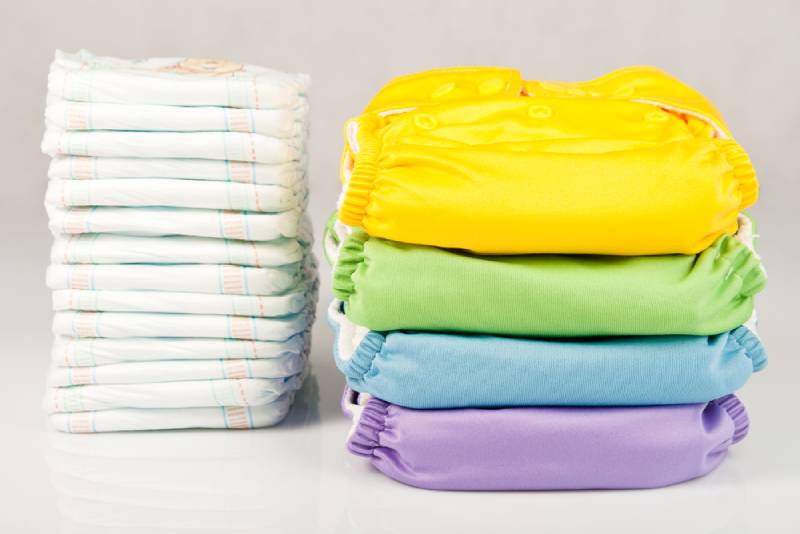
And saving the environment is becoming a rather serious topic, one that I try to include myself in more and more every chance I get.
On the other hand, eco-friendly diapers, while not reducing the number of diapers that you have to use (in some cases), they do fully decompose in a mere 180 days, an amount staggeringly lower than their counterparts from the more common diaper brands.
They’re also a composting option should you take the proper steps in doing so.
Benefits Of Using Organic Disposable Diapers
1. Biodegradable
The most obvious one for a start, as previously explained, the green alternative disposable diapers take a lot less time to fully decompose than their synthetic counterparts.
2. Fragrance-free
The best organic diapers tend to stray away from any man-made perfumes and fragrances, letting them avoid irritating the nostrils of you or your child and avoiding any potential diaper rash that said chemicals may cause to their sensitive skin.
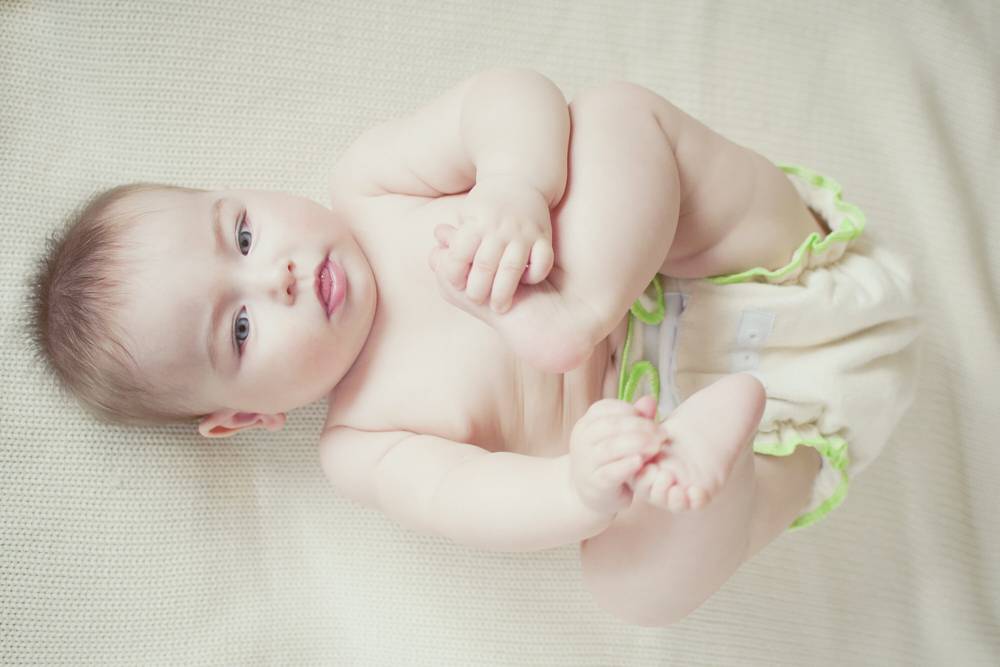
3. Phthalates-free
Phthalates are a class of chemicals that add to the flexibility of plastic.
While there are lots of said chemicals that fall into the category, several of them are allegedly linked to a number of health issues ranging from asthma to even ADHD and the like, something one would think twice about before exposing their little one to it.
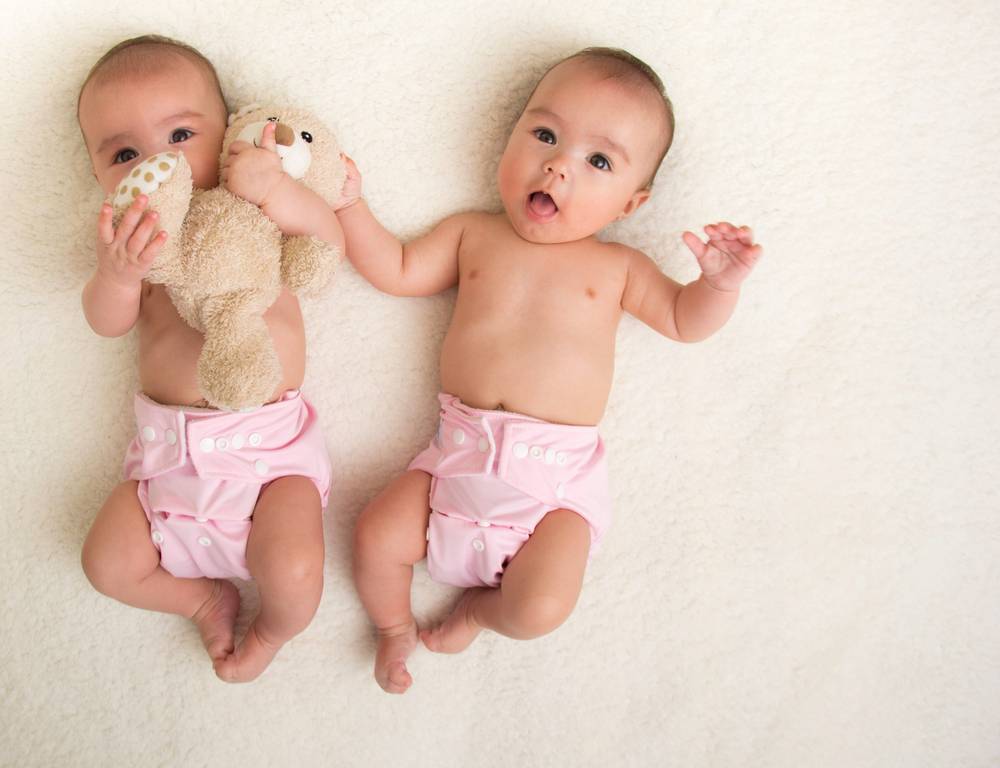
4. No artificial lotions
The best “green” diapers use natural plant oils, such as aloe vera and the like, avoiding any artificially made ones to reduce the harmful impact on their baby’s skin.
5. Chlorine-free
In the manufacturing of regular disposable diapers, chlorine bleaching is a process used to whiten the wood pulp out and make it appear as white as you see on the packaging covers.
The problem with this is that the latent chlorine emits harmful chemicals such as dioxins, which are tied to being one of the potential causes of cancer and I would rather not expose my child to anything that might cause it long-term harm, or at least reduce it by as much as I can.
There is nothing worse than hearing about someone’s child suffering because of their neglect.
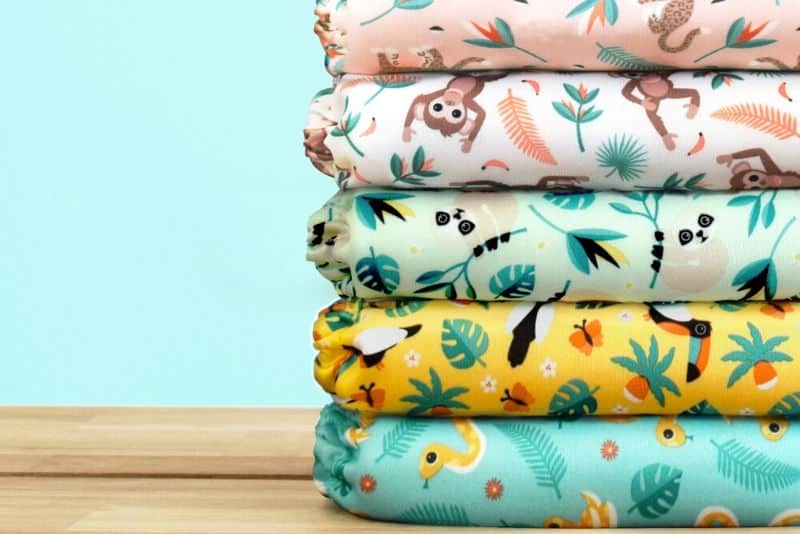
6. Equally as absorbent as other baby diapers
Surprisingly enough, green diapers perform just as well as regular disposables in terms of absorbency, some even outperforming them in some cases (like with Bambo Nature Diapers and Nature Babycare).
The fact that most of them are made from bamboo attributes to this due to the plant’s ultra-absorbent properties, helping keep the baby dry at all times.
A great sign for moms everywhere since that means fewer spills and fewer chances for your baby to smear their load over your furnishings during ‘happy accidents’.
7. Hypoallergenic
Diapers made from bamboo are less likely to cause allergies in babies than the ones you typically see on store shelves.
Bamboo disposable diapers tend to be both easier to manufacture, given how easy it is to grow bamboo, and offer a more allergy-free way of diapering your little one.
It’s best to keep to this since you don’t want your child to start developing a nasty allergy in their youth.
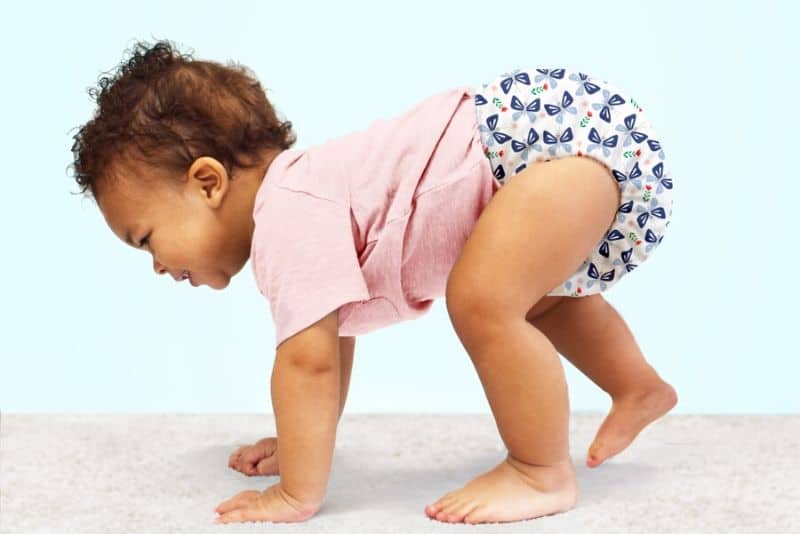
8. (Mostly) chemical-free
While being green is the staple trademark of natural diapers, being purely chemical-free is not a trait many such baby diapers share.
Sodium polyacrylate, for instance, is a chemical substance used in the manufacturing of diapers to both absorb moisture and keep the baby comfortable, but it is known to cause diaper rash rather frequently (Honest Company Diapers are an example of this as are many others not on this list).
9. Comfort
Last, but not least, and definitely one of the most important factors.
Thanks to the great bamboo and its absorbent core that I’ve already praised earlier, natural diapers made from it provide your little one with an added dose of comfort, one that isn’t lost when you swap from their artificial cousins and is something I valued the most when I was looking for what to get for my kids.
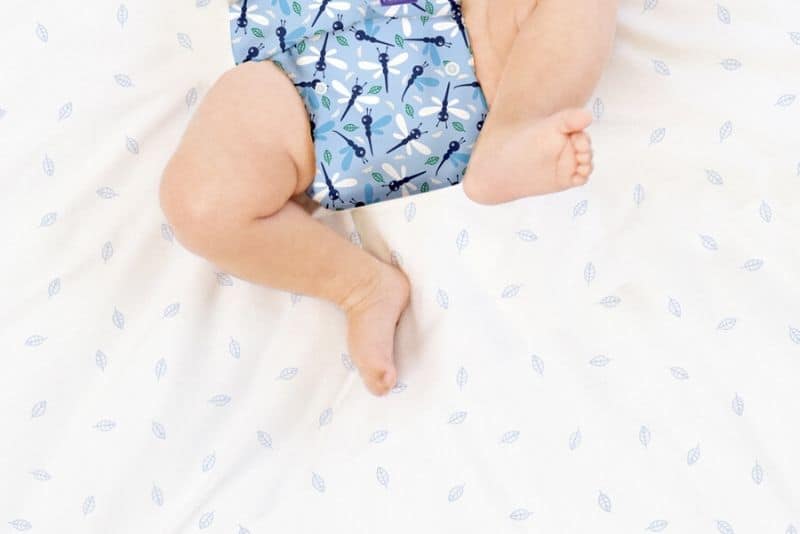
Cons
Now before you go rushing off to the internet and ordering a set from Amazon, natural disposable diapers do have flaws to them as well.
I am here to help you see the good and the bad sides of both.
1. Price
The most common problem with the natural option is the fact that they can end up costing up to twice as much as the more commonly seen diaper brands.
While some of the better ones end up costing a little less, overall it is still quite the price to pay considering the number of diapers necessary for the baby’s growth period.
It racks up to quite the bill in these penny-pinching times, especially for lower-middle-class households.
Plus, there are other baby products to consider so we can’t just blow our entire baby budget on diapers alone.

2. Availability
Because they are not quite a common practice yet, most eco-friendly diapers are not readily available in stores and are usually found being sold online through, as I had mentioned earlier, Amazon, eBay, the company’s own website, or the like.
This makes parents be all the more organized in keeping a neat stock around for emergencies since we all know how late online packages tend to arrive on occasion (or in what mishandled states they come in), and accidents won’t pause for it.
3. Quality
Swapping out artificial for organic is nice for the environment and all, but it sacrifices convenience for us and, most importantly, quality.
Why pay more for a product that is worse at keeping safe from blowouts or any other form of leak protection due to poorly constructed leak guards, leg cuffs, and waistbands, if you could just get a pair of Pampers Swaddlers for half the price?
4. More overall work
If you are looking to utilize these “green” disposable diapers, then be prepared for a bit of extra work when it comes to saving the environment due to some special composting rules that come with them, like scraping your little one’s messes off into the toilet and removing any plastic parts (usually the resealable tabs on the side, as some brands still do use them despite being environmentally friendly).
Sometimes it might not be worth it to add more to your already very busy plate whilst taking care of a baby. The health of the planet is important, sure, but so is yours. Make sure to gauge between the two carefully.
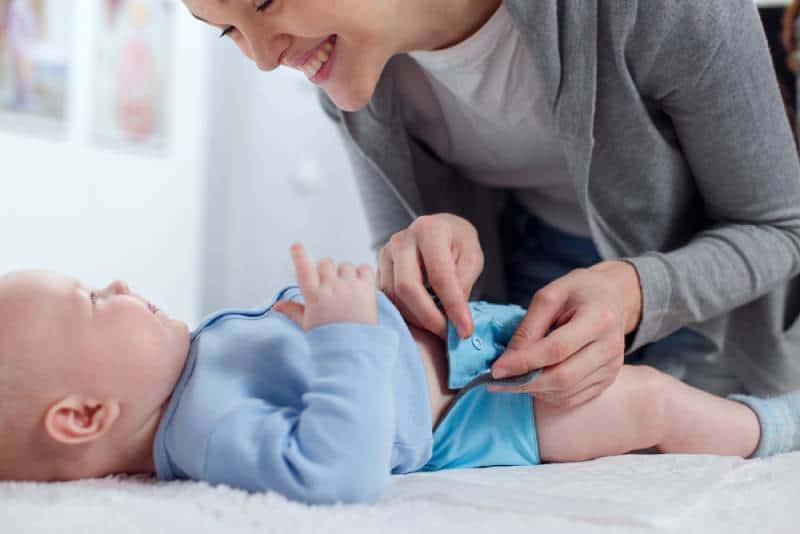
An Alternative to The Alternative: Cloth Diapers
If budget is your overall concern, but extra work is not, you might want to take a look at organic cloth diapers.
Usually made from organic cotton and similar materials, these diapers are a one-time purchase and end up costing a lot less than either of the two aforementioned options.
Quite comfortable too, due to the extra added “’fluff” most of them tend to carry in them as padding for your baby’s bottom.
This is because these diapers are machine washable and can even serve as training pants in some cases, depending on the size of the diaper for use in potty training.
Usually having about 15 to 25 of these is enough to last you throughout the entire period, but you do need to wash them regularly.
The “brown” side of cloth diapers
While having a cheap alternative is nice, cloth diapers aren’t exactly the dream they’re made out to be.
The frequent need to wash them is already a great concern, introducing the hidden cost of the water and electricity bill you’ll be racking up (still adding up to less money overall, don’t worry) as the number of times your washing machine turns on increases.
Problem is that you need to do it while the stain is still fresh on the back-sheet, otherwise get ready for some stubborn stains.
That, and you might not want to let a messy nappy linger around the house too much lest that malicious odor starts to spread.
Cloth diapers also generally tend to be bad in blowout protection due to their innate looseness, and they tend to cause a lot more diaper rashes than the organic and popular brand ones do due to the nature of the messes.
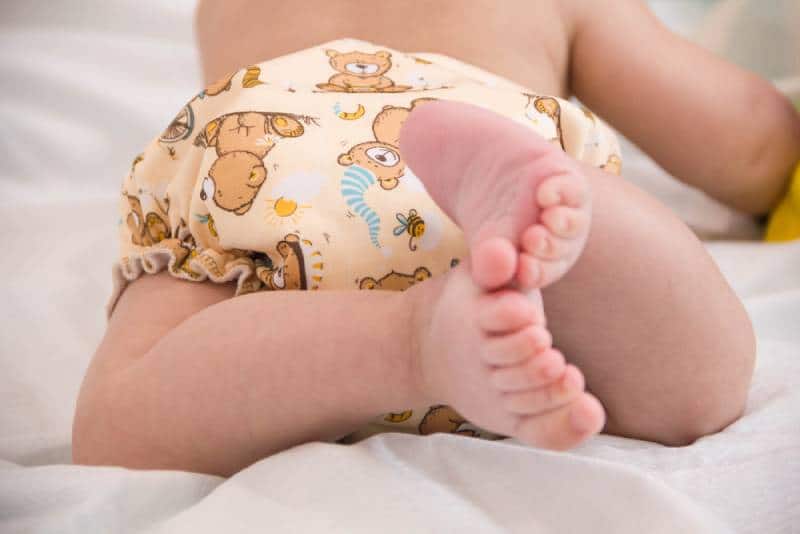
Which is the best then?
With all of this in mind, you might ask yourself which ones are for you. Don’t worry, I’ve got you covered in case all of the above information was a bit much for you.
If you’re looking for an affordable way to still contribute to the bettering of our environment, reducing your own carbon footprint, and not being bothered by the extra washing you’d have to do, go for the organic cloth diapers.
If you have no problems spending a bit extra to “go green” while keeping your babies’ interests (and their sensitive skin) in mind, then go for the more eco-friendly route of organic diapers.
And lastly, if you can’t afford the extra cash or workload, then don’t feel ashamed for using the regular store-boughts. However, I’d recommend grabbing either a Pampers Pure, Huggies Little Snugglers, or Pampers Swaddlers if you can help it, since they are at least somewhat environment and baby-friendly.
All that said, personally, I would consider organic ones as the best diapers, otherwise, I would not be writing all of this to you.
The extra monetary expenses were negligible compared to the comfort of my kids or that of nature, and if you find the right ones, I am sure you too will find an agreeable price for your own baby budget.
Naturally, I am here to help with that too, so I have compiled a list of a few brands that may or may not interest you, and to save you time between lengthy internet searches of the “best organic disposable diapers.”
What to look for?
If none of these seem like your cup of tea, or it was just too much of a read, here is a concise list of what you should be looking for when browsing for the ideal diapers for your youngest:
- Bamboo or cotton-made
- Free of chlorine, lead, phthalates artificial fragrances, and oils/lotions (chlorine-free is usually marked as TCF)
- Natural products
- Snaps over Velcro since snaps are easier to size-up in
To sum it all up
As you can see, each sort of baby diaper has its own different qualities and it just depends on which ones are the best for you, your baby, and your baby’s skin, since a diaper will be part of most of their newborn life. And a comfortable diaper is a good diaper!
Arguably the best option is to mix and match, even a little bit helps Mother Nature heal up. And if you can find time and money to squeeze those in, then the world is all the better for it…
When it comes to pull-ups for older kids, there are some options available but not at the level of regular diapers.
In the end, this is all my personal opinion after all and I am just sharing my experiences.
Some of these may not be right for you, but I do hope I have helped guide you in making the right decision for you and your baby.
READ NEXT: Do Diapers Expire At Any Point And What Happens If They Do?
Like this article? Please share or pin it for later. You can also stay in the loop and follow us on Facebook, Instagram or Pinterest.
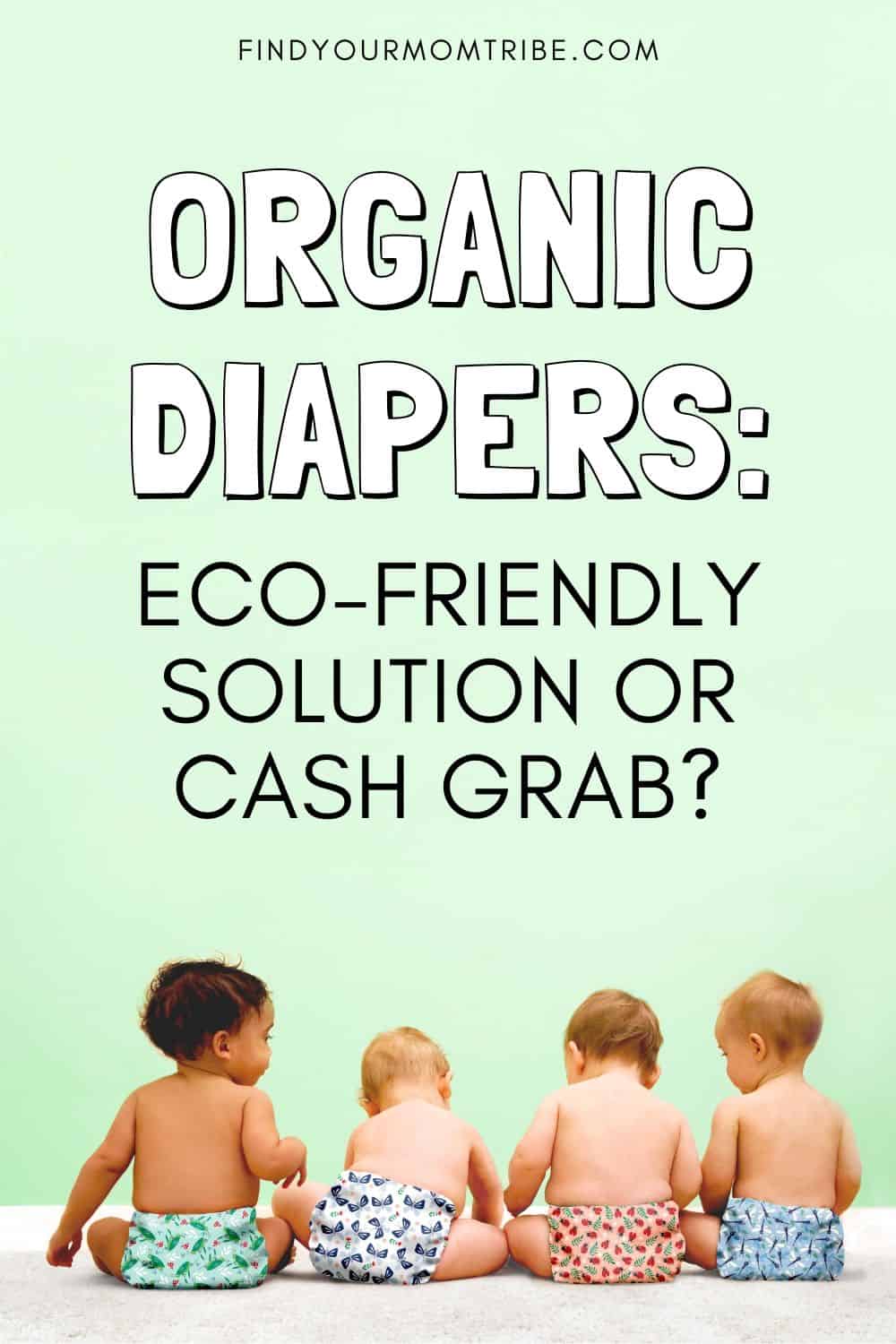
We love honesty! Find Your Mom Tribe is an Amazon Associate and we earn from qualifying purchases through affiliate links at no extra cost to you. Please see our full Amazon Affiliate disclosure for more information.

